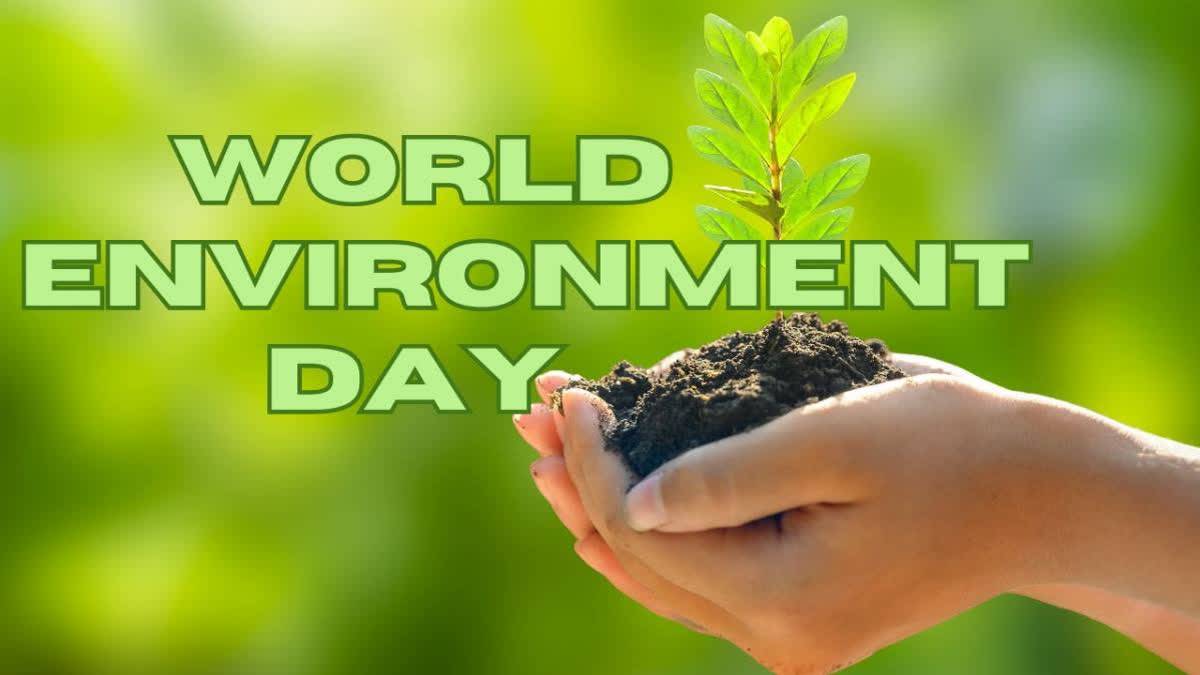Hyderabad: World Environment Day is an annual event led by the United Nations Environment Programme (UNEP) and is being celebrated across the globe since 1972 on June 5.
Since then, it has become a global platform to raise awareness about the necessity to protect the environment from mostly human led activities which has been credited for deteriorating the natural climatic conditions leading to increase in temperatures, melting of icebergs and several others.
The theme of World Environment Day (WED) 2024 is 'Our Land - Our Future, We are #GenerationRestoration.'
History of WED
The United Nations General Assembly established this day in 1972 to raise awareness and promote action for environmental protection. It all began with the United Nations Conference on the Human Environment in Stockholm, Sweden, on June 5. This conference started with important talks about protecting the environment.
This was happening in the backdrop of post World War 2 scenario and the prevailing Cold war at that time while the world was still recovering from the horrors of two World Wars, use of atom bombs over Hiroshima and Nagasaki while wars were still going in several countries including in Cuba, Vietnam and others.
Since 1973, WED is observed annually on 5 June. Over the past five decades, it has grown to be one of the largest global platforms for environmental outreach, with tens of millions of people participating online and through in-person activities, events and actions around the world.
Theme for 2024
This year, the annual event is being hosted by the Kingdom of Saudi Arabia, with a focus on land restoration, desertification and drought resilience. The theme of World Environment Day (WED) 2024 is 'Our Land - Our Future, We are #GenerationRestoration'.
The Kingdom of Saudi Arabia is the global host for World Environment Day 2024, reaffirming its commitment to protect the environment and promote sustainable development, in line with the Vision 2030 goals. It is celebrated all over the world, with tens of millions of people participating every year.
It serves as an important opportunity to raise awareness about environmental issues and promote environmental protection measures. In March 2019, the UN General Assembly adopted a resolution declaring 2021–2030 the UN Decade on Ecosystem Restoration. This World Environment Day aims to support accelerated progress on these commitments, with Saudi Arabia's campaign connecting with the theme of COP-16, 'Our Land, Our Future', and the 'We are #GenerationRestoration' slogan of the UN Decade on Ecosystem Restoration.
According to UNEP, "Globally, countries have pledged to restore one billion hectares of land – an area larger than China – by protecting 30% of land and sea for nature and restoring 30% of the planet’s degraded ecosystems. Championing the 2030 Agenda of shifting the world onto a sustainable and resilient path and joining forces to protect people and planet, World Environment Day 2024 will contribute to building momentum for climate action by rallying support for vital ecosystems restoration work."
Ways To stop desertification and combat drought
1. Promote organic farming
Promoting organic farming will not only save the texture of a fertile soil but will also reap products which are 100% safe and healthy.
2. Plant trees
With the process of urbanisation moving at a great speed in the developing countries, swaths of land with millions of trees are being reduced to dust in order to build industries, houses or to establish cities. This has led to major environmental issues including land losing its water holding capacity. Therefore, more and more trees should be planted not just for the sake of oxygen but also for the quality of the land.
3. Restore freshwater ecosystems
Freshwater ecosystems sustain the water cycles that keep land fertile. They supply food and water to billions of people, protect us from droughts and floods, and provide a habitat for countless plants and animals. Yet they are disappearing at an alarming rate due to pollution, climate change, overfishing and over-extraction. People can stop this by improving water quality, identifying sources of pollution and monitoring the health of freshwater ecosystems. Cities should champion wastewater innovation that addresses sewage management, stormwater runoff and urban flooding.
4. Renew coastal and marine areas
Oceans and seas provide humanity with oxygen, food and water, while mitigating climate change and helping communities adapt to extreme weather. According to UN, more than 3 billion people, primarily in developing nations, rely on marine and coastal biodiversity for their livelihoods. Countries can restore blue ecosystems – including mangroves, salt marshes, kelp forests and coral reefs – while enforcing strict regulations on pollution, excess nutrients, agricultural runoff, industrial discharge and plastic waste to prevent them leaching into coastal areas.
5. Generate financing for restoration
Move bank accounts to financial institutions that invest in sustainable enterprises, donate to restoration or crowd-fund innovations that can help save the planet. According to the United Nations, growing populations coupled with unsustainable production and consumption patterns fuel demand for natural resources has put excessive pressure on land to the point of degradation.
"Desertification and drought are driving forced migration, putting tens of millions of people each year at risk of displacement", it says. Therefore, the occasion of WED should be utilised to create awareness around the ill effects of harming the environment and the various reasons to disseminate sustainable and environmentally- friendly activities.



